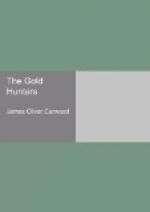He was first to mount the driftwood, and then he gave vent to a huge grunt. The smoke was rising from beside a charred log which was heaped half-way up its side with ashes and earth. In a flash the meaning of the ash and dirt dawned on Rod and his companions. The fire was banked. Those who had built it were gone, but they expected to return. The naked footprints were thick about the camp-fire, and close to one end of the charred log were scattered a number of bones. One after another Mukoki picked up several of these and closely examined them. While Rod and Wabigoon were still gazing about them in blank astonishment, half expecting attack from a savage horde at any moment, the old warrior had already reached a conclusion, and calling to his companions he brought their attention to the tracks in the sand.
“Same feet!” he exclaimed. “One man mak’ all track!”
“Impossible!” cried Wabi. “There are—thousands of them!”
Mukoki grunted and fell upon his knees.
“Heem big toe—right foot—broke sometime. Same in all track. See?”
Disgusted at his own lack of observation, Wabigoon saw at once that the old pathfinder was right. The joint of the big toe on the right foot was twisted fully half an inch outward, a deformity that left a peculiar impression in the sand, and every other track bore this telltale mark. No sooner were the two boys convinced of the correctness of Mukoki’s assertion than another and still more startling surprise was sprung on them. Holding out his handful of bones, Mukoki said:
“Meat no cook—eat raw!”
“Great Scott!” gasped Rod.
Wabi’s eyes flashed with a new understanding, and as he gazed into Rod’s astonished face the latter, too, began to comprehend the significance of it all.
“It must have been the madman!”
“Yes.”
“And he was here yesterday!”
“Probably the day before,” said Wabi. The young Indian turned suddenly to Mukoki. “What did he want of the fire if he didn’t cook meat?” he asked.
Mukoki shrugged his shoulders but did not answer.
“Well, it wasn’t cooked, anyway,” declared Wabi, again examining the bones. “Here are chunks of raw flesh clinging to the bones. Perhaps he just singed the outside of his meat.”
The old Indian nodded at this suggestion and turned to investigate the fire. On the end of the log were two stones, one flat and the other round and smooth, and after a moment’s inspection of these he dropped an exclamation which was unusual for him, and which he used only in those rare intervals when all other language seemed to fail him.
“Bad dog man—mak’ bullet—here!” he called, holding out the stones. “See—gold—gold!”
The boys hurried to his side.
“See—gold!” he repeated excitedly.




